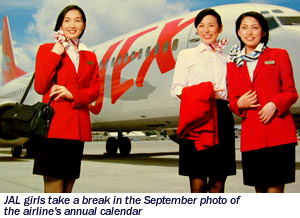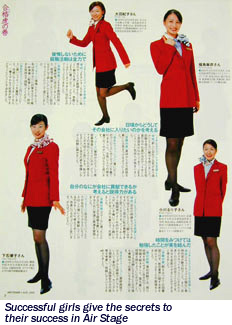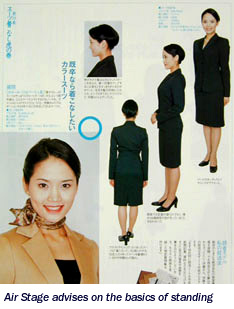The Unfriendly Skies: Becoming a Flight Attendant in Japan
I grabbed the bridge of my nose and then rubbed both nostrils with my right thumb and forefinger. "This isn't right," I said and tossed the police report on my desk and fumbled for a cigarette.
Junior reporter Junko frowned and pulled at some lint on the right leg of her pantsuit, obviously a stall for the buildup. Then she fumed: "So you weren't drunk and screaming marriage proposals to the flight attendants on hand at the Japan Airlines press briefing last week?"
 I spun in my chair and faced out my office window.
I spun in my chair and faced out my office window.
"Oh, you mean, was I doing some of the necessary legwork on my flight attendant-in-the-making story?" I waved my cigarette in the air so that she was sure to see my disgust in her faith in some flatfoot's half-baked recount of a minor incident over my unparalleled - or as many in the industry are wont to say, Pulitzer caliber - news reporting reputation and then offered, "How about if I let the final product do my talking for me?"
Before she could answer, I quickly spun back around, brushing aside the first issue of Weekly Playboy in my stack at the edge of my desk, and grabbed a file folder. I handed her the report inside.
The exam started getting a little tough with the algebra problem. Then there were the math questions involving square roots. This was even before things progressed to the questions on Japanese history and Mozart.
"I don't remember such things from college and high school," moans Hanako Ito. But she had better. That is, if she wants to fulfill her dream of becoming a flight attendant.
This written test, given by Austrian Airlines, is one of dozens of similar exams administered by various international and domestic airlines to a dedicated, and desperate, legion of young women in Japan each year. With Japan's male-dominated work society rendering a women's typical means of employ to pushing papers and serving tea in an office, becoming a flight attendant is the highest - if not the most revered - job attainable. But with this prestige brings intense competition amongst the candidates. Subsequently, a cottage industry of companies has been spawned, all eagerly offering their services to assist these ladies in developing that small edge in attaining their dream of serving in the sky.
It always begins with the dream. For Ito, hers came to her after she had spent many of her initial years after college in New Zealand, Australia, and France studying English and French.
"I was inspired by the positive feeling I gained from my international experiences and I want to assist in providing this same feeling to others - if I can."
But the odds are heavily stacked against the girls from the start. For example, a recent recruitment by Singapore Airlines accepted only 20 girls out of the roughly 2,500 applications that were submitted. For some of the larger domestic carriers, like All Nippon Airways, the number of applications can exceed 20,000 in a year.
"It is like winning the lottery," Ito says of the odds of being accepted.
And for the last year, she has been dutifully trying to increase her chances of claiming a jackpot by going through the very cold and calculated application and interview process with over 10 different airlines.
Ito's current job is working part-time serving drinks and snacks from a vending cart on the Narita Express, a train that moves between the greater Tokyo area and Narita Airport. Oftentimes, this is one way that girls can show prospective employers that they have a knack for the service industry. Since she can't support herself on the small wage offered, she lives with her parents.
 But things wouldn't be much better financially if she does move up from train to plane. Even though Air Stage, a monthly magazine dedicated to doling out advice on every aspect of becoming a flight attendant - including hints on the "balance" needed in penmanship for the application form and the proper feet position necessary in the portfolio of photos, often profiles successful flight attendants lounging in their swank apartments in such places as London, their starting salary is oftentimes not more than the office workers they so desperately want to avoid becoming.
But things wouldn't be much better financially if she does move up from train to plane. Even though Air Stage, a monthly magazine dedicated to doling out advice on every aspect of becoming a flight attendant - including hints on the "balance" needed in penmanship for the application form and the proper feet position necessary in the portfolio of photos, often profiles successful flight attendants lounging in their swank apartments in such places as London, their starting salary is oftentimes not more than the office workers they so desperately want to avoid becoming.
This doesn't deter Ito in the least. Thai Airways is her next target. "We'll be paid at a level relative to the standard of living in Thailand," she says. "I am a little worried, but if I make it, I can't stop to think about money."
Nor does the fact that the job is very tiring and most girls are forced out of their cabins and onto ticket counters after a few years of work. Some are so enamored with the opportunity that they'll even pay for the privilege. Japan Airlines (JAL) offers package tours for girls to travel and play flight attendant; they literally dress up in an actual uniform and serve each other. A recent trip went to New Zealand.
Enrolling in a special school is nearly always the first step for these girls. There are dozens in Tokyo alone. Air Stage is filled with ads for such schools; some feature smiling mug shots of past success stories; others boast of offering top hair and make-up instruction.
Ito's school offers classes in, amongst other things, bowing, honing interview skills, and English conversation. Additional classes are available once an airline makes a recruitment announcement. When Singapore Airlines made public its intention to hire the 20 girls, her school began offering an 8-week "Singapore Special Class" for 40,000 yen (this in addition to the standard tuition that often exceeds 100,000 yen each quarter). Such classes often purport to have an insight into the secrets of achieving success at a particular airline.
Ito, though, is a little skeptical that such secrets really exist. After her application was accepted with Singapore, she was granted a group interview. It went like this: "I had it with 6 girls and it took me just 60 seconds. It was unbelievable. I couldn't even say my name. I just read an in-flight announcement in English, and said that I have a job on the Narita Express - that's it."
Further, she recalls one girl whom everyone at school thought was the ideal candidate; she had a strong educational background, a wonderful personality, and, above all, stunning looks. In summary, she was made to don JAL's beige apron and serve drinks from a cart. But when she applied at JAL, she failed. She also failed in her attempts at 5 more airlines before finally landing with Dubai-based Emirates.
Given this case study and Ito's personal experience with the random nature of the interviews and exams, she is convinced that success is mainly in the hands of lady luck. And since all the candidates are carefully instructed by the schools and Air Stage on every aspect of the process (from the proper answers to give in the interviews to the types of hobbies they are supposed to partake in), she has concluded that her best chance lies in focusing the crux of her energies on getting the application accepted. This means putting all her eggs in the one thing in the application that can be significantly different from all others: the portfolio of pictures.
 She has evidence for such a theory. Her applications were oftentimes rejected until she signed up for the top-notch photo studio that resides within Shinjuku's Isetan department store. To shoot ten frames costs her roughly 20,000 yen. Each print made from a negative can run another 3,000 yen. In addition to giving pointers on how girls can take the shots themselves, Air Stage has ads from other studios whose services are cheaper. But for Ito it has been worth the price. Since she made the switch from getting her photos done at the lower-priced places, she is batting a thousand in moving to the interview stage.
She has evidence for such a theory. Her applications were oftentimes rejected until she signed up for the top-notch photo studio that resides within Shinjuku's Isetan department store. To shoot ten frames costs her roughly 20,000 yen. Each print made from a negative can run another 3,000 yen. In addition to giving pointers on how girls can take the shots themselves, Air Stage has ads from other studios whose services are cheaper. But for Ito it has been worth the price. Since she made the switch from getting her photos done at the lower-priced places, she is batting a thousand in moving to the interview stage.
The expense doesn't stop with the schools and photos. Ito has also joined a fitness club to meet Thai Airways' swimming requirement. She practices three times a week. Some girls even go so far as to opt for dental work to improve their chances.
Time, too, is another consideration. At 24, Ito only has a few more years of eligibility before being rendered an old maid, at least in airline parlance. JAL generally only accepts candidates that are fresh from college. Other international carriers cut off applicants once they reach their mid-to-late 20s.
But what exactly is it about being a flight attendant that makes all this trouble and expense worth it?
"Flying is a very romantic thing," she says. "There used to be a TV drama a few years ago. It presented a wonderful image of a flight attendant's life overseas - a very gorgeous job, lots of shopping, lots of dates..."
Would she ever even consider an office job?
"I can't do that. I can't keep sitting," she laughs. "I must be flying."

